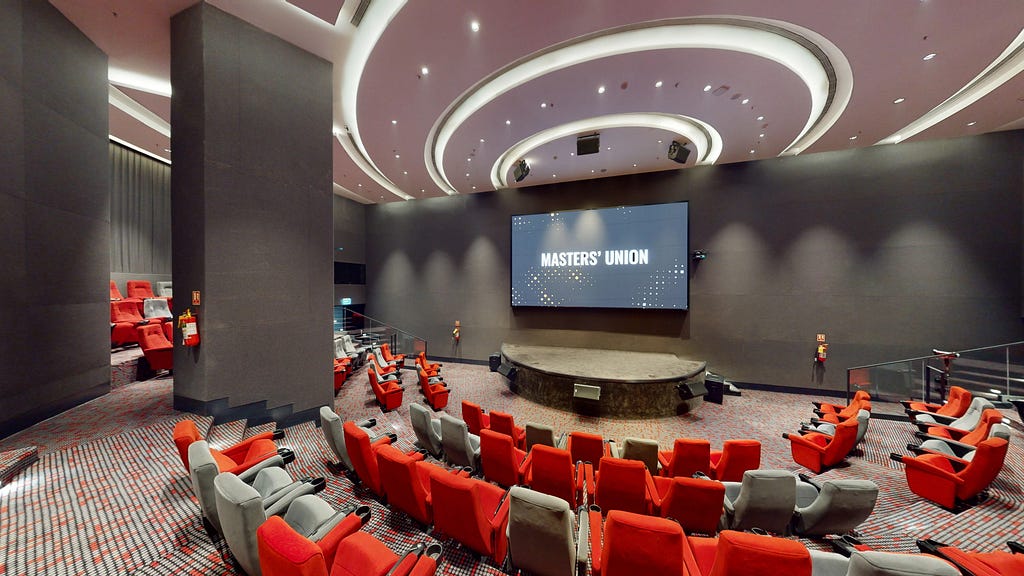
The Anatomy of a New-Age Business School
In Frame: Masters Union
In recent years, India has witnessed a significant surge in the number of students aspiring to pursue business and management education. This growing demand has led to the establishment of numerous business schools across the country. However, traditional business schools continue to grapple with various challenges that hinder the career outcomes of their students.
Recognizing this gap, a new breed of business schools has emerged, aiming to address these issues and capitalize on the opportunities within the sector. The emergence of these new-age business schools marks a pivotal moment for India’s higher education system, poised for disruption and driven by compelling growth factors.
India Witnesses a Significant Number of Students Every Year Who Wish to Pursue Business and Management Education
Every year, India witnesses a burgeoning number of students aspiring to pursue business and management education. This overwhelming interest in business education is driven by the socio-economic incentives that are often associated with a management degree. Our conversations with key stakeholders highlight 3 key reasons for such a trend:
Career Advancement and Professional Growth: An MBA or similar management degree often acts as a gateway to higher positions within an organization. In a competitive job market, having a business degree can offer greater job security and stability, as companies value the diverse skill set that business graduates bring.Diverse Career Options and Career Mobility: Graduates with business degrees can find opportunities in various sectors including finance, marketing, human resources, operations, and consulting. This diversity allows students to align their careers with their interests and strengths. The transferable skills gained through business education provide the flexibility to switch roles or industries as well, leading to increased opportunities for career mobility.Networking Opportunities: Business schools boast strong alumni networks that provide ongoing support, mentorship, and job opportunities to graduates. These networks are often influential in various industries. The cohort system in many business programs often encourages interaction and learning from peers, who come from diverse backgrounds and bring different perspectives.
This Has Led to a Trend of Increasing Intake across Business Schools in Recent Times to Meet The Rising Demand
This rising demand for business and management education has prompted many business schools to increase their intake capacities significantly. To accommodate the growing number of aspiring students, institutions are expanding their cohorts, thereby admitting more students into their programs each year.
While the supply of seats across business schools has increased, there has been a significant uptick in interest in management courses, driven by triggers such as people’s willingness to keep pace with the rising demand for new-age technologies and the growing need for upskilling.
However, Most Traditional Business Schools Still Have Multiple Challenges That Continue to Exist
Traditional business schools have long been the cornerstone of management education, producing generations of leaders and innovators. However, in today’s rapidly evolving business landscape, these institutions face a myriad of challenges that threaten their relevance and sustainability.
Despite their long-standing reputations and academic rigor, traditional business schools face significant hurdles in maintaining the quality and applicability of their education. Our conversations with stakeholders have highlighted 6 key challenges that most traditional business schools face:
Quality and Relevance of Content and Curriculum: Traditional business schools often struggle to keep their curricula updated with the latest industry trends and technologies, resulting in a disconnect between what is taught and what is needed in the modern business environment.Lack of Practitioner-Led Teaching Across Programs: These schools typically rely heavily on academic faculty, which results in a lack of practical, real-world insights and experiences being integrated into the teaching across programs.Lower Focus on Learnability in Pedagogical Approaches: Traditional teaching methods may not place enough emphasis on active learning and adaptability, potentially limiting students’ ability to develop crucial skills for continuous learning and adaptation in a rapidly changing business environment.Flexibility and Personalization Across Curriculum: Many traditional business schools have rigid program structures that offer limited opportunities for students to tailor their education to fit their individual career goals and personal interests.Limited Focus on Entrepreneurship and New Age Career Paths: There is often insufficient support and resources dedicated to fostering entrepreneurship and preparing students for emerging career paths, which are becoming increasingly important in today’s dynamic job market.Limited Alignment with Evolving Industry Demands: Traditional business schools may struggle to align their programs quickly with the evolving demands of the industry, potentially impacting the relevance and employability of their graduates in a fast-paced business landscape.
The Existence of Such Challenges Often Leads to Poor Career Outcomes for Students
The existence of various challenges within traditional business schools often leads to poor career outcomes for students. These institutions struggle to keep their curricula updated, rely heavily on academic rather than practitioner-led teaching, and offer limited flexibility and personalization in their programs, which leads to gaps in the student learning experience and employability aspects for graduates.
Recruiters constantly face the challenge of skill gaps amongst graduates and the inability to discover the right talent. According to the Unstop Talent Report 2024, 66 percent of recruiters and 42 percent of university partners feel the skill gap and lack of preparation are major challenges in campus recruitment.
As a result, graduates from traditional business schools frequently face lower employment rates, reduced starting salaries, and diminished satisfaction with their career progression compared to those from more innovative and adaptable business programs.
A New Class of Business Schools Is Emerging to Solve This Gap and Tap the Market Opportunity
Indian business school education is all the buzz with new age companies starting up colleges and offering full-time residential UG and PG programs to bridge the challenges faced by traditional schools and offer better career outcomes to students that align with their aspirations:
Masters’ Union
Launch Year: 2020
Program Offering: UG and PG Programmes in Tech and Business Management
Campus Location: GurgaonMesa School of Business
Launch Year: 2023
Program Offering: PGP in Startup Leadership
Campus Location: BangaloreTETR College of Business
Launch Year: 2024
Program Offering: Bachelors and Masters in Management and Technology
Campus Location: GlobalAlteria Institute of Management by Digiaccel
Launch Year: 2023
Program Offering: PGP & PGPEx in Applied Marketing
Campus Location: GurgaonScaler School of Business
Launch Year: 2024
Program Offering: PGP in Management and Tech
Campus Location: BengaluruPhysicswallah Institute of Innovation School of Management
Launch Year: 2023
Program Offering: UG Course in Entrepreneurship and Tech Management
Campus Location: BengaluruInstitute of Venture Building
Launch Year: 2024
Program Offering: UG Program in Entrepreneurship
Campus Location: ChennaiRishihood University
Launch Year: 2024
Program Offering: Makers Undergrad – BBA
Campus Location: Sonepat, Haryana
These innovative institutions focus on delivering relevant, practitioner-led education, emphasizing flexibility, personalization, and alignment with current industry demands.
By integrating modern pedagogical approaches and fostering entrepreneurial skills, these new-age business schools aim to produce graduates who are better equipped for the dynamic and rapidly evolving business landscape, ensuring superior career outcomes and greater satisfaction among their students.
Dissecting Such Programs Reveals Key Insights into the Space and the Playbook for New Age Business Schools
In Frame: Mesa School of Business
From our conversations with operators and students across many new-age B-Schools and extensive market research in the sector, we understand that there are key areas of differentiation where most new-age business schools try to build significant competitive moats over traditional schools, which also becomes a key part of their positioning with consumers:
Asset-light model of operations with a focus on scalability: While most traditional business schools had asset-heavy operations and infra setups, certain new-age business schools have seen an inclination towards being asset-light to support higher asset and capital utilization, and bring scalability and flexibility into operations.Industry-dominated micro-market preference for building learning spaces: Most new-age business schools tend to have operations close to micro-market catchments with highly dense industry presence which can unlock multiple benefits such as reduced friction with the industry, higher accessibility for program needs, and multiple levers of engagement with potential stakeholders.Focus on building aspirational learning spaces with high learnability quotient: Experiential learning spaces and aspirational infra setups marked by aesthetic campus elements lend a premium positioning power to new-age business schools leading to enhanced brand equity, and support flexible and adaptive learning by allowing students to unlock value through diverse use cases.Leaner and scalable functional team formats: Leaner teams in play across multiple new schools driven by the need for flexibility across team structures and increased focus on achieving higher staff utilization, leading to organizational agility in operations.High-impact advisors and backers acting as opportunity drivers: New-age business schools have seen a focus on inculcating advisory boards and onboarding investors who can create value across program and growth-related aspects by providing strategic guidance, support in networking and building partnerships, and driving the brand positioning of the school.Secular shift in faculty focus with a higher degree of industry orientation: While most traditional programs had a focus on academia, new-age business schools have seen a higher degree of focus on a practitioner-led faculty mix to deliver hands-on experience to students, provide networking and career guidance, and create an edge for them with knowledge of latest industry trends.Diverse playbooks across faculty operations with flexibility in faculty mix and incentives: From a faculty operations point-of-view, there is increased diversity across faculty mix with a higher focus on freelance practitioners over in-house academics, and compensation structures have seen an inclination towards variable incentives with hourly charges driven by the quality of faculty and demand for the course.Increased flexibility and student centricity in curriculum design: Intent to operate with flexibility in the ownership of the curriculum and instructional design with team-faculty collaborations at play amidst shifting demands of industry and students, with instances of complete ownership of content and instructional design by external faculties while the team retains control of curriculum.Emergence of diverse areas of student support: New-age business schools are looking at enhancing the overall student experience with diversification in student support areas with the inclusion of differentiated elements such as personalized mentorship and incubation support with access to student-focused funds.Focus on holistic evaluation: Evaluation methodologies are becoming increasingly holistic across the spectrum of new-age business schools with a rising focus on project-based and skill-based evaluation, in addition to academic evaluation.Focus on flexible regulatory environments with a lower focus on accreditations: While most traditional business schools focus on accreditations as a major component of their value proposition, new-age business schools prefer to have a leaner approach to regulatory compliances to support flexibility in program and curriculum, and create scope for innovation.Content and influencer marketing becoming key across GTM and growth strategies: Marketing budgets have been skewed towards content and influencer marketing with budgetary allocation going as high as 50%. There has been a strong focus on brand-led growth with a dual focus on building institutional and founder brands while operating with innovative and creative content formats.Extensive scholarships are a key part of GTM strategy amidst longer admission cycles: Scholarships as high as 50%–80% are being offered to founding cohorts to attract high-quality students into the program as part of GTM. Admission funnels are also longer across new-age business schools going up to 6–9 months, aimed at bringing down CACs and optimizing conversion rates.
As we delve deeper into the anatomy of these new-age business schools, it becomes clear that their approach significantly differs from traditional business models. This new paradigm promises better career prospects for graduates and also sets a benchmark for future business education in India, thereby, helping build the growth story for such institutions.
India’s Business Higher Education is Ripe for Disruption With Several Growth Drivers Backing the Rise of New Age Business Schools
In Frame: Masters Union
Given the stark gap in expectations of aspirational students and the offerings of most traditional business schools, the opportunity for outcome-focused new-age schools to disrupt a seemingly large Indian business higher education market is prudent and the need of the hour.
From our conversations with key stakeholders across many new-age B-Schools, several key growth themes have emerged that are expected to drive the thesis for the rise of such new-age business schools:
Outcome orientation of the Indian student: Indian students have historically had a differentiated focus on programs with strong economic outcome orientation, leading to skewed preferences towards programs that have good placements or can lead to other economic opportunities. New-age programs are well-placed to capitalize on the market gap by over-indexation on creating career outcomes for students.Lack of aspirational programs in business education: Given the low number of aspirational business programs in the Indian market as compared to the demand for such programs, new-age business schools are in a sweet spot and can witness tremendous growth by creating aspirational value for students with differentiated value proposition across both program and non-program related aspects.Focus on evolving industry needs and practical skillset: Most traditional business schools have a larger focus on theoretical and academic education and lack the intent and agility to cope with the evolving needs of the industry. Given the leaner operational frameworks adopted by most new-age business schools, there is greater scope to add value and innovate at a pace that keeps up with the industry.Emergence of new PMF: Rise of an equity story focused on the emergence of a new product market fit for a business model that is a hybrid of traditional higher-ed and ed-tech setups.Signs of institutional interest: While angel investors’ interest stays resilient in new-age programs, greenfield setups have also recently seen institutional rounds. The increasing interest of institutional capital providers in the sector driven by founder-first pitches and resilient business models focused on value creation has been a key growth theme.Strong levers for scalability across business model: Asset light models lead to higher scalability quotient with growth drivers being parallel product offerings across executive education, K-12, and upskilling, and pricing advantages brought in by the aspirational value that most new-age business schools focus on creating for their students.
The rise of new-age business schools in India signifies a transformative shift in the realm of management education. These institutions, in addition to addressing the persistent challenges faced by traditional business schools, are also redefining the educational experience to better align with industry needs and student aspirations. As the landscape of Indian business education continues to evolve, these forward-thinking institutions are well-positioned to lead the way, ensuring that the next generation of business leaders is equipped with the skills and knowledge needed to thrive in a dynamic global economy.
LoEstro Advisors is an investment banking firm specializing in sell-side fundraise and M&A advisory, along with a strong consulting arm. Recognized as the No.1 financial advisor in education in India, we are the advisor of choice to India’s blue-chip education businesses.
Over the last four years, we have grown to be one of India’s largest (in terms of M&A transactions) homegrown boutique investment banks, with $1.2bn+ worth of combined deals closed across education, healthcare, consumer, and technology sectors.

